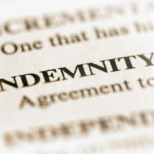
Defending a negligence claim against a property professional
4th December 2023 by Brendan Herbert
If you are a professional working in the property sector, you may at some point face a claim from a disgruntled client claiming that you have been negligent in your advice, or in your work for them. This can affect any property professional, such as surveyors, estate agents, builders, conveyancers, project managers and architects, amongst others.
‘The property market is notoriously erratic and changes quickly, so it can be a daunting prospect to prove that you were not negligent when faced with a claim against you,’ says Brendan Herbert, head of dispute resolution with Laceys Solicitors. ‘Even if you are found not to have been negligent, any claim takes its toll, and may affect your capacity to attract fresh work, so it should be dealt with as quickly and efficiently as possible.’
Brendan looks at what action you can take to prove that a claim is unjustified.
Who can make a claim?
A claim against any property professional in negligence will only be successful if it can be shown that you acted in breach of a duty owed to that claimant, and that breach of duty caused an actual loss to them.
There does not have to have been a contractual relationship between you. A property professional, like all professionals, has a general duty of care towards their clients, and potentially other third parties, that goes beyond contractual duties.
The duty of care can extend beyond the person that engaged you, however it has to have been reasonably foreseeable that damage might be incurred by the claimant as a result of a negligence, and so the more remote the relationship, the less likely it will be that that person can prove their claim. However, generally any person who has suffered loss as a direct result of your negligence can bring a claim against you as a professional.
Time limits
One of the first things we check when looking into defending a professional negligence claim is the limitation period. Generally this is six years from the date the damage was caused; or if it was not apparent at that time, three years from the date when the claimant knew, or ought to have known, of the damage. There are many arguments that arise out of the question of knowledge which we can discuss with you, but overall there is a long stop time limit of 15 years maximum before which a claim has to be brought against you.
What is considered negligence for a property professional?
The fact that something goes wrong in itself does not necessarily mean that you have been negligent. It must go beyond this. The general test is whether you have made an error which no reasonable member of your profession, given the same circumstances, would have made.
An example might be that of a valuation agent providing an inaccurate valuation. Valuation is not an exact science, and simply because you did not value a property at the same rate as another valuer does not mean you were negligent. A court will consider a range within which reasonable valuations will fall, and will take into account that there will always be a margin of error. It is only if the valuation falls outside of that margin of error that it may be considered negligent.
In contrast, a surveyor who does not spot that there is a subsidence issue may be found to be negligent, or a conveyancer who fails to spot a right of way over a property may be negligent. These are all issues that a reasonably competent professional should not get wrong in the same circumstances.
What has to be proved?
There are a number of points that must be proved to show you were negligent in your duty.
- Was there a duty of care not to cause harm to this particular claimant? This can be straightforward if you were a professional engaged by the claimant for a particular purpose. For example, an architect engaged to design a conservatory and there was a fault with the design.
- There must have been a breach of that duty.
- There must have been some quantifiable loss caused to that claimant.
- There must be a link between the duty you owed and the damage caused, so that but for your negligence the claimant would not have suffered any loss.
What are potential defences to a professional negligence claim?
Bearing in mind what needs to be proven, you will be able to defend a claim against you if you can show that any one of these criteria has not been adequately met.
Did you actually owe a duty of care to this claimant? A court will start by considering whether the damage suffered by the claimant as a result of your actions was reasonably foreseeable. They will look at whether there was a sufficiently proximate relationship between you, and whether in all of the circumstances it is ‘fair, just and reasonable’ to find that you owed a duty of care to this person.
If the claimant gets over this first hurdle, they will need to prove that you breached that duty to them. It is up to the claimant to show that you made an error which no reasonable member of the same profession would have made in the same circumstances. You can obtain expert evidence to confirm that your actions were those of a reasonable professional.
If the claimant gets over that hurdle, then they will need to show that they actually suffered a loss. The court will apply the ‘but for’ test, taking the position of the claimant now, compared to what their position would have been had negligence not occurred. If you can show that the loss would have occurred anyway, then you have a defence.
What loss can be claimed and how is loss calculated?
The loss suffered must have been caused directly by the breach of duty owed. Pure economic loss is specifically excluded, except in certain circumstances. This means that compensation for loss of profit cannot usually be claimed, but compensation to rectify actual issues caused can be claimed. For example, a surveyor who negligently inspects the roof of a restaurant may be held liable for the sums required to fix the roof, but may not be held liable for the loss of profit of the restaurant as a result. Any loss must be a foreseeable consequence of the negligence and cannot be too remote.
If a claimant or another third party is found to have contributed in some way to the negligence, then this may be considered by the court when deciding what compensation to award.
Should the claimant have mitigated their loss?
Yes, there is a specific duty for a claimant to try to mitigate their loss, and equally, not to make the loss worse. It will be for you to show that a claimant did not take steps to mitigate their loss, or they exacerbated the loss by their action or inaction.
How does the insurer fit in?
Most professionals are insured for negligence, and so you will need to make your insurer aware of any potential claim against you as soon as possible.
If you are insured and wish to settle a claim out of court, you will probably need the consent of your insurer. Sometimes your insurer may wish to settle, but for reputational reasons you may wish to continue to defend. If you do decide to settle, then often a confidentiality clause will help to avoid any problems with negative publicity. We will ensure any settlement works for you.
How we can help
If you are facing a claim for negligence, take legal advice immediately. Our solicitors have many years’ experience in dealing with claims of professional negligence, and will support you throughout the process and thereafter.
For further information, please contact Brendan Herbert on 01202 377810 or via email at b.herbert@laceyssolicitors.co.uk



